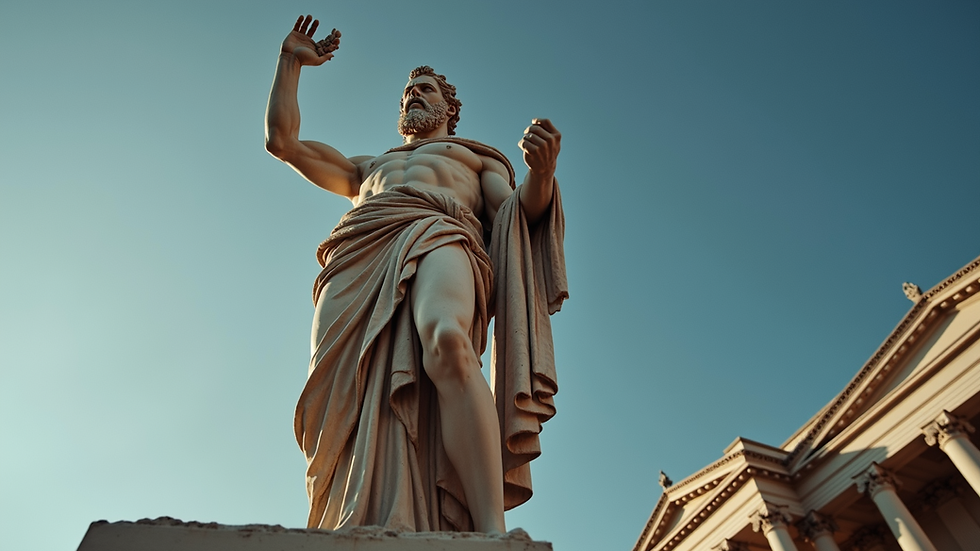Intertwining Myths of Zeus and Jesus
- PsychicUnderLord (Psychic)

- May 28
- 5 min read
Updated: Jun 12
The figures of Zeus and Jesus Christ stand as towering icons in the stories of ancient mythology and modern religion. While they arise from different belief systems and cultural backdrops, a closer look reveals fascinating similarities between these legendary figures. From their divine characteristics and relationships to their influence on humanity, exploring these connections provides compelling insights into the human experience throughout history.
In this blog post, we will uncover the common threads that connect Zeus and Jesus. We will delve into the importance of the 2,500-year global ascension cycle linked to the precession of the equinoxes and examine the prophetic dimensions surrounding Christ. As we explore these themes, we will also trace Zeus's historical origins back to the Titans, sometimes linked to the Nephilim, and how these narratives resonate with esoteric beliefs about human evolution.
The Divine Characteristics of Zeus and Jesus
Zeus and Jesus both embody divine traits that symbolize power, authority, and compassion.
Zeus, the chief deity of ancient Greece, ruled over Mount Olympus and was famous for wielding lightning bolts as a representation of his formidable strength. He was regarded as a protector of humanity, often intervening to help mortals in times of need. For instance, in many myths, Zeus defended heroes like Perseus and Heracles, showing his commitment to justice.
Similarly, Jesus is revered as the Son of God in Christianity, known for his teachings of love, self-sacrifice, and salvation. His miracles, such as feeding the 5,000 and raising Lazarus from the dead, resonate with the divine attributes seen in Zeus. While Zeus represents the pantheon of gods in Greek mythology, Jesus offered a monotheistic vision that has influenced billions of believers around the globe.
Despite their dissimilar contexts, the mythological and moral frameworks of both figures reveal striking parallels. Both serve as intermediaries between the divine and the mortal, embodying the hopes and aspirations of their respective followers.
The Legends' Influence on Society
The legacies of Zeus and Jesus extend far beyond their immediate mythologies, deeply influencing art, literature, and cultural practices throughout history.
Zeus has inspired countless works of art, from ancient sculptures to modern films like "Clash of the Titans," exemplifying authority and the complexities of human behavior. Jesus's impact is visible in literature, music, and community engagements. His teachings continue to guide moral values, as evidenced by more than 2.3 billion Christians who celebrate his life and message every day.
Both figures play crucial roles in shaping social norms and ethical frameworks, often serving as metaphors for common human struggles and aspirations. Through examining their stories, we gain insights into the values and experiences that have shaped their narratives.
The Cosmic Ascension Cycle
Central to these myths is a larger cosmic structure known as the global ascension cycle, which is tied to the precession of the equinoxes. This phenomenon involves the gradual shift of Earth’s axis, occurring over a span of approximately 25,920 years. This cycle influences astrological and spiritual beliefs, implying that humanity goes through periods of enlightenment, growth, and transformation.
This idea closely aligns with the prophetic themes associated with Christ, who is often viewed as a symbol of divine ascension and spiritual evolution. Different cultures have anticipated major shifts during these cycles, believing they signal transformative new eras.
Take, for example, the transition from the Age of Pisces, linked to Jesus Christ, to the forthcoming Age of Aquarius. This shift is characterized by ideals such as unity and collective consciousness, echoing the teachings of compassion and service found in Jesus’s messages.
This cosmic perspective raises intriguing questions: How do these cycles shape human destiny? Can the traits of Zeus and Jesus mirror our collective ambitions for transcendence and illumination?
The Prophetic Dimensions of Christ
In Christian theology, prophecies about the coming of Christ hold immense significance. Biblical texts echo visions of the Messiah that convey themes of salvation, renewal, and divine intervention.
These prophecies build upon previously established cycles of knowledge and enlightenment. As the precession of the equinoxes progresses, the longing for a redeemer gains deeper cosmic meaning.
Much like the stories surrounding Zeus, which often speak of returning golden ages, the prophecies associated with Christ reveal a rich narrative of hope and transformation. Communities have formed around these beliefs, striving to navigate the evolving patterns of their respective ages.
The Ancient Origins of Zeus: From Titans to Gods
To fully grasp Zeus's narrative, we must explore his ancestry, tracing his origins to the Titans, often equated with the Nephilim in various interpretations.
The Titans were powerful beings in Greek lore, considered the ancestors of the Olympian gods, including Zeus. They represented the chaotic forces of nature and the tumult from which order emerged. Zeus’s rise to power is marked by his triumph over the Titans, symbolizing the classic struggle between chaos and order—a theme also prevalent in Christian teachings about good and evil.
References to the Nephilim in biblical texts, described as giants or offspring of "sons of God" and "daughters of men," reveal dialogues about shared divine heritages. This interpretation suggests a connected narrative of deities that transcends cultural boundaries.
As we draw similarities between these figures, we begin to recognize patterns of belief embedded in human culture—a deep-rooted yearning for understanding and a connection to the divine.
The Intersection of Myths and Human Experience
The parallels between Zeus and Jesus reveal vital truths about the human quest for understanding and connection to a higher realm.
Throughout history, societies have grappled with existential questions around creation, morality, and purpose. In response, they crafted myths and religious narratives reflecting their aspirations and fears.
The stories surrounding Zeus impart lessons on leadership, nature, and life's unpredictability, while the life of Jesus conveys themes of love, sacrifice, and forgiveness. Both narratives significantly reflect their cultures' quests for wisdom and moral guidance in tumultuous times.
Today, as modern society wrestles with questions of identity and purpose, exploring these ancient stories serves as a reminder of our part in a larger cosmic story. These interconnected narratives underscore humanity's drive for meaning through diverse perspectives.
Convergence of Beliefs: Cultural Syncretism
In our rapidly changing world, the blending of beliefs has accelerated. Cultural syncretism, characterized by the fusion of diverse beliefs and practices, has fostered fascinating comparisons.
Elements of Greek mythology have influenced Christian narratives and vice versa, sparking rich conversations about divinity and humanity.
This blending is evident in artistic expressions and philosophical discussions that incorporate ideas from both traditions. Such interactions showcase our shared human experience, encouraging understanding and insights drawn from various backgrounds.
The Relevance of Myths in the Modern World
In our current landscape, where science frequently intersects with spirituality, the timeless tales of Zeus and Jesus remain profoundly relevant.
Both figures provide frameworks for navigating complex human existence, prompting us to ponder fundamental questions regarding good and evil, authority and defiance, love and sacrifice.
During uncertain times, people often look to these archetypes for direction. Just as Zeus and Jesus bridged the gap between the divine and the earthly realms, modern seekers can find peace in their stories, illustrating the lasting influence of myth.
Moreover, these legendary figures inspire us to explore the deeper aspects of existence while grappling with the concepts of fate and free will.
Reflections on the Intertwining of Myths
As we uncover the layers of history, we reveal a captivating connection between the narratives of Zeus and Jesus, leading us to explore cosmic cycles and profound prophecies. Their stories resonate with our shared human experience, reflecting our ongoing quest for understanding in an expansive universe.
By examining Zeus's lineage from the Titans and considering Christ's prophetic dimensions, we unveil a narrative woven with shared memories, wisdom, and aspirations.
As we navigate the currents of modern life, let these legends encourage us to seek connections, appreciate our shared pasts, and embrace the cyclical nature of existence. In doing so, we honor the myths that have shaped us and the prophecies guiding us toward illumination and ascension.






Comments